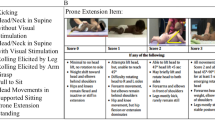Abstract
The onset of five early milestones was studied in premature and full-term infants. The milestones are: recognition of mother's voice and face, 3-month smile, following through 180°, and two hand-eye coordination. It was hypothesized that premature infants would show delay in acquiring milestones related to time separated from mother. Compared to full-term infants, the prematures had a significant difference in the means only for the onset of smiling, and no effect related to maternal separation.
Similar content being viewed by others
References
Gesell AL, Amatruda CS: In H Knobloch & B. Pasamanick (Eds),Developmental Diagnoses (3rd ed). New York, Harper & Row, 1974.
Stuart HC: Physical growth and development. In HC Stuart & DG Prugh (Eds),The Healthy Child. Cambridge, Harvard University Press, 1964.
Hollingshead AB, Redlich FC:Social Class and Mental Illness. New York, Wiley, 1958.
Bowlby J: The nature of the child's tie to his mother.Int J Psychoanal 34:1–23, 1958.
Polak PR, Emde RN, Spitz RA: The smiling response to the human face, I: Methodology, quantification and natural history.J Nerv Ment Dis 139:103–109, 1964.
McGraw MB: Neural maturation as exemplified in the reaching-prehensile behavior of the human infant.J Psychol 11:127–144, 1941.
Griffiths R:The Abilities of Babies. New York, McGraw-Hill, 1954.
Watson EH, Lowrey GH:Growth and Development (3rd ed). Chicago, Year-book Medical Publisher, 1958.
Klaus MH, Jereauld R, Kreger JC: Maternal attachment, importance of the first postpartum days.N Eng J Med 286:460–463, 1972.
Fraiberg S: Psychiatry and mental health. Presented at the American Academy of Child Psychiatry meeting, Toronto, October 1976.
Hobel CJ, Oh W, Hyvarinen MA, Emmanoulides GC, Erenberg A: Early versus late treatment of neonatal acidosis in low birth-weight infants: Relation to respiratory distress syndrome.J Pediatr 81:1178–1187, 1972.
Koivisto J, Blanco-Sequeiros M, Kraus U: Neonatal symptomatic and asymptomatic hypoglycemia.Dev Med Child Neurol 14:603–614, 1972.
Medical World News, August 4, 1972, pp 44–51.
Stewart A: The risk of handicap due to birth defect in infants of very low birth-weight.Dev Med Child Neurol 14:585–591, 1972.
Upadhyay Y: A longitudinal study of full-term neonates with hyperbilirubinemia to four years of age.Johns Hopkins Med J 128:273–277, 1971.
Liley AW: The foetus as a personality.Aust NZ J Psychiatry 6:99–105, 1972.
Spelt DK: The conditioning of the human fetus in utero.J Exp Psychol 38:338–346, 1948.
Salk L: The mother's heart beat as an imprinting stimulus.Trans NY Acad Sci, Series II,24:753–763, 1962.
Avery ME, Frantz I: Commentary: Intrauterine developmental retardation.J Pediatr 87:956–957, 1975.
Beckoff M, Fox MW: Postnatal neural ontogeny: Environment-dependent and/or environment expectant?Dev Psychobio 5:323–341, 1971.
Powell LF: The effect of extra stimulation and maternal involvement on the development of low-birth-weight infants and on maternal behavior.Child Dev 45:106–113, 1974.
Scarr-Salapatek S, Williams ML: The effects of early stimulation on low-birth-weight infants.Child Dev 44:94–101, 1973.
Freedman DA: Congenital and perinatal sensory deprivation: Their effect on the capacity to experience affect.Psychoanal Q 44:62–81, 1975.
Sugar M: Premature and full-term infant-caretaker interactions. Presented at the 8th International Congress of Child Psychiatry, Philadelphia, July 1974.
Saint-Anne Dargassies S: Neurological maturation of the premature infant of 28 to 41 weeks gestational age. In F Faulkner (Ed),Human Development. Philadelphia, Saunders, 1966.
Lubchenco LO, Delivoria-Papadopoulos M, Searls D: Long-term follow-up studies of prematurely born infants, II: Influence of birth weight and gestational age on sequelae.J Pediatr 80:509–512, 1972.
Rose SA, Schmidt K, Bridger WH: Cardiac and behavioral responsivity to tactile stimulation in premature and full-term infants. Presented at the meeting of the Society for Research in Child Development, Denver, April 1975.
Littman B: Prematurity, peripheral nerve myelination and the measurement of conceptional age. Presented at the meeting of the Society for Research in Child Development, Denver, April 1975.
Rice RD: Premature infants respond to sensory stimulation. Presented at the meeting of the American Psychological Association, Chicago, September 1975.
Rubin RA, Rosenblatt C, Balow B: Psychological and educational sequelae of prematurity.Pediatrics 52:352–363, 1973.
Wiener G: Scholastic achievement at age 12–13 of prematurely born infants.J Special Education 2:237–250, 1968.
Author information
Authors and Affiliations
Additional information
The author is grateful to Juan-Washington, MD, former Director, and his staff, of the Newborn Intensive Care Unit, and to the Premature Outpatient Clinic of Charity Hospital in New Orleans for their excellent cooperation during this study; M. Kelly, RN, former Director, and her staff, at the Mary Buck City Health Clinic; Lawrence Van Egeren, PhD, and Lawrence Weber, PhD, for help with the statistics; David Taylor for the computer programming; David A. Freedman, MD, and Gerald Wiener, PhD, for their critical reading of the manuscript.
Rights and permissions
About this article
Cite this article
Sugar, M. Five early milestones in premature infants. Child Psych Hum Dev 8, 11–24 (1977). https://doi.org/10.1007/BF01463473
Issue Date:
DOI: https://doi.org/10.1007/BF01463473




